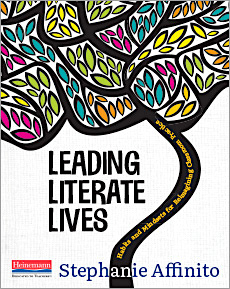How Our Reading and Writing Lives Impact Kids
Leading Literate Lives: Habits and Mindsets for Reimagining Classroom Practice
By Stephanie Affinito
(Heinemann, 2021 – Learn more)
Reviewed by Rebecca Crockett
 In my constant quest to improve my teaching practice, my goal for summer was to focus on improving student engagement by providing authentic reading and writing opportunities in my classroom. Stephanie Affinito’s book, Leading Literate Lives, seemed to fit the bill – but not in the way I had expected.
In my constant quest to improve my teaching practice, my goal for summer was to focus on improving student engagement by providing authentic reading and writing opportunities in my classroom. Stephanie Affinito’s book, Leading Literate Lives, seemed to fit the bill – but not in the way I had expected.
As I dove into her book, I was thinking it would follow a typical format of what changes I needed to make in my practice and why they were necessary, and then give some examples of what these types of modifications looked like inside the classroom.
 Instead, I found a book centered around me as a reader and writer and using those experiences to help students find their own joys in literacy.
Instead, I found a book centered around me as a reader and writer and using those experiences to help students find their own joys in literacy.
Rather than being merely instructional, Affinito asks educators to be reflective and evaluative in viewing their own lives as readers and writers. She coaches them to cultivate their literacy habits with simple and varied tips and then guide their students to the gratification to be found in reading and writing. That is the primary focus of her book.
Reflecting on reading to make it visible
In the first section, “Reading,” Affinito focuses on the importance of reflecting and analyzing our current reading choices to improve and see where we may grow.
She urges us to read daily, as we so often tell our students they need to do to develop as readers and writers. Setting aside time, finding places to sneak in reading, and using schedules and reminders are all part of the WHAT in the book.
But she goes on to explain HOW to find books that both reinforce your reading preferences and also challenge you to be well-rounded and purposeful. She urges relying on reading communities and partners to find, discuss, and relate to books. And she pushes us to share our reading lives with our friends, our students, and online – to make it visible to “acknowledge our status as readers and invite connections with others based on our reading habits, interests, and inquiries” (64).
If we don’t first see ourselves as readers, how will students see us that way and internalize the value of reading in daily life?
Becoming the writer you want to see in class
The section on writing acknowledges that this is the more difficult of the two literacies to practice and feel confident in, but it continues asking teachers to look at their personal writing habits and pushing them to become the writers they want to see in their classrooms. She tasks us with “reclaim[ing] [our] own writing lives to better support the teaching of writing in [our] classrooms” (87).
Her straightforward and practical methods to begin this journey (get a notebook, show up daily) and her plethora of ways to find ideas, approaches, and reasons for writing leave no room for excuses. Having finished the book, I went on my own search for the perfect notebook and began with one of her ideas for expanding my writing life. As in the reading section, Affinito offers places to go for connection, inspiration, and community.
Making literacy accessible to students
I’ve focused on the reflective aspects of the book, which do truly seem to be the primary purpose, but Living Literate Lives doesn’t forget the classroom application facet or the fact that most of the book’s readers are looking for ways to make literacy more relevant and accessible to students.
For each idea given on how to increase reading and writing presence and practice in the educator’s life, Affinito pairs a “Here’s How to Bring It to the Classroom” section.
From ways to create book stacks to make student reading lives visible – to using students’ natural curiosity to increase their writing – to exploring ways to use mentor texts, she draws connections between what educators should be doing in our ‘literate lives’ so that students do them, too.
Many of the application and crossover ideas she features would not have occurred to me, and I learned about several good online resources. These classroom sections also sparked my own new ideas for my classroom. I can’t wait to use book stacks with my students, and I guarantee that I will be using many of the writing approaches to encourage my students to explore their writing lives this year.
Once I finished reading the section on writing, I wanted a conclusion – something to wrap up both sections and provide a word of encouragement on my new literacy journey, but alas, the book just ends. If I had one criticism it would be this lack of a satisfactory ending that draws from and perhaps even touches on the ideas from the introduction. It’s the English teacher in me I guess.
Nevertheless, Living Literate Lives is a refreshing read that asks teachers to first become practiced readers and writers and then to model these same routines to students.
Affinito strikes the perfect balance between encouraging reflective pedagogy and giving sound teaching practices for reading and writing. Her book is full of ways to alter mindsets and set habits to develop educators who are “real deal” – those who truly practice what we preach – so we can pass the love we have for literacy on to our students authentically.
Rebecca Crockett is currently an English teacher for grades seven and nine in north central Idaho. A fourteen-year teaching veteran, she has taught at both the elementary and secondary levels. She is an avid reader, curriculum planner, and sometimes writer for her own enjoyment and to practice what she preaches. Summers find her devouring professional development books to improve her craft; thus she has written many reviews for MiddleWeb. Since 2013, she has been part of the Idaho Coaching Network whose focus is providing professional development and improving teacher practice.
































